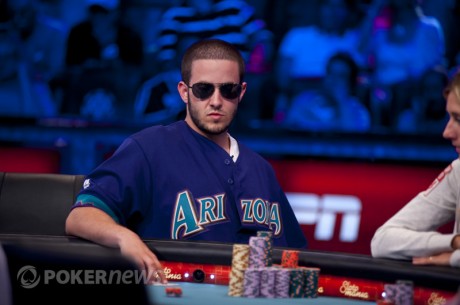by Andrew Brokos
Previously published on CardPlayer.com
I play mid-stakes no-limit hold’em cash games and tournaments online. I provide exclusive coaching videos for Card Player Pro, powered by PokerSavvy Plus. My columns will explore important concepts illustrated by hands that I analyze in my instructional videos. As a Card Player reader, you’ll have access to clips of these hands and many others.
- 20:10 Darren Kane and Tony Rivera by ozzobears on Apr 24, 2019 17,391 views. 30:49 Strip poker inevitably leads to hot gay sex by EvanFan0 on Apr 23, 2019.
- Tony Rivera's Results, Stats. Date Country Place Prize; 20-Jun-2016: United States: $ 80 + 15 No Limit Hold'em Green Chip Bounty Double Stack 2016 Parx Casino Recurring Tournaments, Bensalem.
Card Player TV tours the home of Tony Rila. He has been playing in major poker tournaments for more than a decade and has numerous cashes and final table appearances all over the country. He has also made five final tables at the WSOP in Las Vegas. On a board of A♦ 4♠ 2♦ J♥ 4♣ and roughly 8,000 in the pot, Rivera bet 2,200 which Chan called after giving the situation some thought. 'I have queens,' said Rivera. 'I have queens,' said Rivera.

I recently finished 35th in the main event of the World Series of Poker, winning $193,000. This column will examine a big pot that I won in the first few hours of the tournament and illustrate the benefits of playing a big hand fast from out of position.

Tony Rivera Poker Game
We were less than an hour into the tournament, but I was already a little unhappy with the way things were going. My starting table didn’t include a lot of superstars, but the player on my left was a phenomenal young pro named Tony Rivera who had already won a bracelet in the inaugural $10,000 Mixed Games.
This hand begins with Tony making a small raise from first position. The blinds were 50-100, and everyone had roughly the 20,000 chips we started with. Tony raised to 250, and another pretty solid player across the table from us called. The action folded to me holding A-5o in the big blind.
Tony Rivera Poker Games
Many people consider Ace-rag to be a “trouble hand”. Especially with deep stacks, there is nothing wrong with just folding here. Playing a weak off-suit Ace out of position against two good players is not exactly an ideal situation. However, if you are disciplined enough to get away from top pair cheaply when it is correct to do so and skilled enough to get full value from your hand when you make something big, then calling to take advantage of the better than 4:1 pot odds is also justifiable. This is what I elected to do.

I was lucky enough to get one of those dream flops: 955, all different suits, giving me trips with the best possible kicker. It can be very tempting to check here and slowplay such a big hand. After all, most hands that would call a bet are going to bet if I check, plus there is a good chance that Tony will bluff at the pot if I check simply because he is the pre-flop raiser.

However, I am concerned about more than just a flop bet. The pot is just 800, and my opponents both have nearly 20,000 chips. To realize the full potential of my hand, I need to get big bets into the pot on every street. Checking now might induce a bluff, but it will also put my savvy opponents, both of whom have position on me, in control of the pot. By checking the flop, I represent weakness. But once I put more money into the pot, whether by raising or calling, the jig will be up. My opponents will realize that I could have trips, and while they may not fold, they will probably check behind at least one street if I give them the option.
Thus, I decided to take control of the pot right away with a bet. Betting three streets is still a strong line, but it is less suspicious than check-raising or check-calling and then betting out on a future street. I bet 600, Tony folded, and the second player called. I put him on a pocket pair on something like T9 that paired the flop. If I was really lucky, he would have trips with a worse kicker, but I couldn’t really count on that.
The turn brought a 6, I bet 1500, and my opponent called again. The river was another blank, I bet 3000, and he paid that off as well. I didn’t get to see his hand, but he later told me he had a pair of Kings and that he didn’t expect me to bet right out with trips on the flop.
It’s very important that I did, though. One of the advantages of position is the ability to control the size of the pot. Good players will generally avoid inflating the pot with a one pair hand by checking at least one street. Thus, when out of position, you cannot afford to put your opponents in charge of the action. When you have a big hand, you need to take control and start building the pot right away.